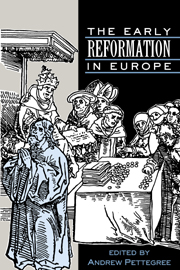2 - Bohemia, Moravia and Austria
Published online by Cambridge University Press: 06 January 2010
Summary
It is commonly assumed that eastern Central Europe was always a stronghold of Catholicism. This assumption, which rests on the outcome of the Counter-Reformation and the Thirty Years War, ignores the fact that Protestantism was so widespread in the area throughout the sixteenth century that it largely reduced the Catholic Church to a minority. It endangered not only the church, but also the Catholic monarchy, for Protestantism everywhere in eastern Central Europe was rooted in the strong political position of the estates: in Poland, the Bohemian lands (Bohemia itself and the incorporated crown lands, Moravia, Silesia and Lusatia), Hungary and the east Austrian provinces of Upper Austria, Lower Austria, Karinthia, Styria and Krain. On the one hand, the firm representative system of the estates favoured and encouraged acceptance of the confessional alternative to the Catholic monarchy. On the other, Protestantism gave the estates a new and superior (because religious) basis for their self-awareness and their political aim of extending and consolidating their independence.
Throughout the region the estates were in a strong position to restrict the freedom of action of the ruling power. In Bohemia, for instance, the king's military and financial requirements depended on the agreement of the Landtag (sném) or diet, and its willingness to raise taxes. So did the election and coronation of his successor. Laws could be passed only with the agreement of all three estates (curiae) of the diet: the higher nobility or barons, the lower nobility or knights, and the royal free cities. The supreme court (Landrecht) and the provincial government were made up of representatives of the nobility.
- Type
- Chapter
- Information
- The Early Reformation in Europe , pp. 23 - 48Publisher: Cambridge University PressPrint publication year: 1992
- 6
- Cited by



